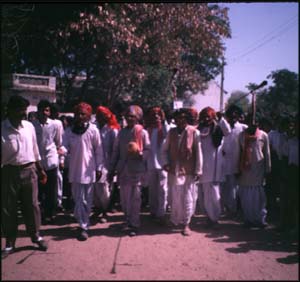Ceremonies
Every year, Bhavai groups visit a particular village on the same specific date. The shows were once much anticipated because Bhavai was the only form of entertainment in earlier days. When the group arrives on the morning of the date of arrival, they stay on the outskirts of the village. The leader of the village, accompanied by the village band of musicians, goes to receive the actors and at that time the group enters the village.
The Bhavai actors are usually housed in the temple or community lodge. Sometimes each actor stays with a different family. The villagers take care of food, bedding, and personal needs.
After lunch, the ceremonies and blessings begin. During the year, if a child was born to a family or there was a wedding, the theater group goes to their homes. One of the actors dresses as the Goddess Amba; others sing lullabies, propitious songs and blessings. After this, the parents of the child or newly weds give the actors presents such as saris, utensils and money.
In the afternoon, there is a storytelling session for the village elders in the temple. Stories from the Ramayana and the Mahabharata epics are told, sung and mimed.
During this session, group members share information of the other villages, community incidents and knowledge about village activities. If there is a feud in the community, the actors will improvise and incorporate the problem into their performance to help ease the tension in the village. Bhavai is deeply connected with the lives of rural people from childhood to old age. The group stays in the village for two to three days and performs in the evenings.
Veshas (playlets) are selected and performed according to the tastes and interests of the villagers. In order to light the performance area, the village barber holds a huge torch fueled by oil provided by the village.
On the last day, actors visit each home and collect money or presents from the villagers.


